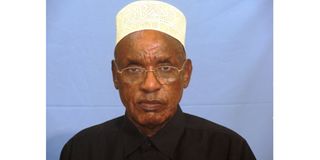Mrema: The ups and downs of a political maverick

What you need to know:
- The blue and white flags of NCCR-Mageuzi were literally all over the country; along the highways, buildings and campaign grounds.
Arusha. Until the end of 1990, Augustine Lyatonga Mrema was not much known in Tanzania’s political landscape.
Only three years before, he had been an MP and countless years prior to that, he served as a government security officer.
During the 1990 General Election, he retained his Moshi Rural Constituency seat, bouncing back to the House.
After being re-elected for his second five-year term, President Ali Hassan Mwinyi appointed him the Home Affairs minister.
This looked like opening of the floodgates for the fiery 46-year-old politician from the slopes of Mount Kilimanjaro.
Mrema hit the ground running. He personally spearheaded a crackdown against all sorts of wrong doers.
His actions soon raised his stakes among the ordinary people and the media who saw him as yet another news maker.
Mrema would visit places to see if law and order was observed, starting from the public transport services.
He was a hero of some sort to the ordinary people as they perceived he sided with them especially during those days of shortage of basic goods.
At some point, he wielded much powers, creating a stir among his cabinet colleagues, especially on the incentives he proposed in order to fight crime.
He was in 1992 elevated to the position of deputy prime minister, may be to give him more teeth while retaining his Home Affairs docket.
There was a debate on the position (deputy PM), with some arguing then that it was not stipulated in the Constitution.
As expected Mrema didn’t survive long in that deputy premier position despite the full backing of President Mwinyi.
In 1994, he was appointed Labour and Sports Development minister; a demotion from the powerful Home Affairs docket graced by deputy PM status.
His formal end with the CCM-led government was soon to come to an end as he remained steadfast in criticising the government from within.
An issue which led to his fallout was a bone of contention over the $ 3.5 million corruption scandal involving a local businessman Vindyadhas Chavda.
Mrema, who breathed his last in Dar es Salaam yesterday, accused the government and the Attorney General for not being clear on the scam.
He was promptly fired by President Mwinyi in early 1995 and soon joined the opposition in readiness for the first multiparty elections the same year.
Mrema was a presidential flag bearer for NCCR -Mageuzi during the 1995 polls, giving the ruling party an unprecedented challenge for victory.
Although he polled about 27.7 percent of the votes cast, there were times the CCM stalwarts were worried by his well attended campaigns.
The blue and white flags of NCCR-Mageuzi were literally all over the country; along the highways, buildings and campaign grounds.
The CCM candidate Benjamin William Mkapa won the polls but Mrema would remain a thorn in his administration’s flesh for some time.
In September 1996, Mrema won the Temeke parliamentary seat against a strong and influential CCM aspirant during a by-election.
Mr Mkapa, who was in New York for his first UN General Assembly session as a Head of State, was reportedly hooked on the hotline to get the final results.
The two were to meet the following year (1997) at Ilala over a standoff on the construction of the Kawawa road that would link Kinondoni and Temeke districts.
There were objections over the removal of the graves near the Karume Stadium but logic ruled the day through the intervention of the Head of State.
But the Mkapa ghost continued to haunt the fallen ex-MP of Vunjo Constituency in Kilimanjaro region.
In 2020, he sought a Sh2billion- compensation from the government over what he termed as “false accusations” made against him during the third phase administration.
The influence of Mrema as the main challenger to the establishment apparently went down after he quit NCCR-Mageuzi to found Tanzania Labour Party (TLP) in late 1990s.
In recent years, he has been at ease with the country’s national leadership so much so that in 2016, he was appointed the chairman of the National Parole Board.



